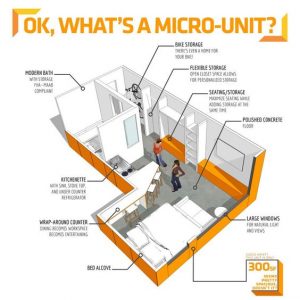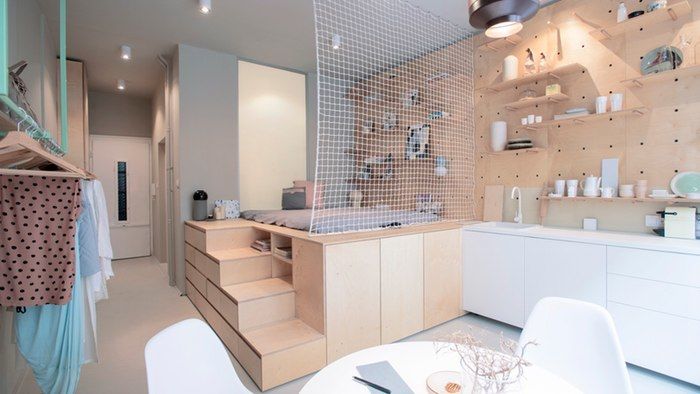Last week in class, a conversation around sharing goods really impacted me. We talked about sharing services such as Car2Go. This made me reconsider what it means to ‘share’ a product and reminded me of a concept I’d heard of previously – micro apartments.
Essentially, micro apartments are apartments with less than 400 square feet of space that only have space for a bed and bathroom (no kitchen). Each person has their own private apartment (no roommates). While there are variations on the model, the essential concept is that people living in the apartments can share kitchens, laundries and living rooms in a common space and minimize the impact of their footprint. This is essentially a dorm but for ‘adults’ minus shared bedrooms and with slightly more amenities per room.

It also allows people to live in preferred or dense locations more affordably than they would be able to in a traditional apartment. (UBC has even proposed a similar concept).
I find this concept really interesting because it caters to the upcoming generation of working adults. These are people who care more about experiences than things. People who would rather live in a cool location than a cushy apartment. People who dine out enough, or spend enough time at work, where they don’t need a personal kitchen.
What’s really intriguing is that the concept of sharing living spaces also affects other forms of consumption. For example, because space is so limited, people must consider additions to furnishings, wardrobes….”stuff” that normally accumulates. It also encourages dwellers to get out of the home and to create experiences rather than just holing in some apartment. Many micro apartments also do not offer parking spaces; because they are usually in such central locations, there is neither space for parking structures nor the need for vehicles. The concept also reduces vehicle emissions & consumption in this way. Because they are so easy to build, micro apartments have also been considered in some cities as solutions to homeless crises.

What I find most compelling about the concept of micro apartments is that they feature so largely in people’s lives. Not only does the lifestyle automatically reduce your day-to-day consumption but living in such a small space will cause renters to reconsider what they really need to survive. While I don’t think this model is feasible for families or couples, I think it is incredibly effective for the working population that it targets. I see this model being very successful in the future.
Sources:
http://crosscut.com/2015/12/living-in-a-micro-apartment-and-loving-it/
http://www.cbc.ca/news/world/micro-apartment-building-nyc-1.3523175
http://www.trendhunter.com/trends/airbnp-micro-apartment
http://lifeedited.com/the-yankeesred-sox-rivalry-of-micro-apartments/

Great concept, especially relevant since real estate prices are so high in Vancouver. This trend is also huge in places like Japan, where their design aesthetics have to incorporate space minimization because of high population density in cities. How much space you need to live comfortably is really influenced by your culture, and it would be great to see people shift to reducing their use of unnecessary space – this helps reduce overall consumption of goods and utilities. Also neat how this low space living style can help provide low-cost housing for homeless people to find their feet!
http://www.realtytoday.com/articles/72093/20160112/kyosho-jutaku-why-micro-homes-largely-popular-japan.htm
http://www.cnn.com/2016/08/22/architecture/japan-micro-homes/
Victoria I really enjoyed your point on cultural impacting how comfortably you can live! It’d be great to see design companies from around the world collaborating to come up with a more feasible and efficient lifestyle.
Micro apartments are such a neat concept! Especially for a university campus lifestyle. You mentioned that the idea isn’t necessarily feasible for families or couples, but I wonder if there’s some variation of the concept that could be applied to slightly larger dwellings. It makes me think of the up and coming idea of eco villages. Basically a community that is self-sustaining, where community members participate in growing food for themselves and the community, among other community needs. Though the idea is still developing, and I believe there are very few communities that are already fully functioning, I do think this might be the next step from these micro apartments.
I’ve never heard of eco-villages that sounds really interesting! Would definitely be interested in learning more – seeing how tasks can be divided, etc. to make it a practical option for everyday people.
Very interesting focus, thanks a lot for drawing attention on this concept!
Indeed I think that this might be the future of housing for a fringe of the population between 18 and 30.
As Carlene was saying, families might have to adapt this concept to fit their own needs.
I think that places like these and the concept of sharing common places might be interesting for elder people too. I think elder people, who are still in good shape but are not seeing lots of people anymore, would be interested in sharing commons, as it would prevent them from feeling lonely or isolated.
Hi! Thank you so much for sharing! I found this idea very interesting and certainly an appealing option for me in the near future! With overall shift in lifestyle towards minimalism, i can definitely see this as an option for single working adults that value more or experiences such as travel. However, while i can see this type of housing thrive outside of student housing in huge and cramped metropolitan cities like New York or Japan, it’s a bit hard to incorporate this to a much slower and sparse city like Vancouver. Most of it because of the way of living in Vancouver combined with the weather that forces us to spend more time inside the house during the summer.
As someone who lives in his van, I can relate to living in a small, confined space that might seem uncomfortable to the outside world. However, contrary to the typical concerns that people have, I think that I live quite a luxurious life. I don’t own a lot, so there’s less clutter, I’m free to travel where I want, and don’t have to worry about being heId down by expensive rent. I think that especially for someone who’s young and flexible, micro homes are a great alternative to a traditional apartment. Living in such a small space almost forces people to make changes for the better, to reconsider what they really need, and minimize their carbon footprint. I believe that the key to changing the way people think about living in small spaces is to not think of it as something that’s just cool or a fad (think minimalism), but a complete change in lifestyle for the better.